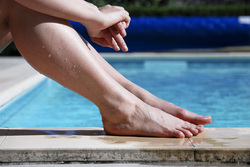 I remember so vividly what a colleague, mentor, and friend expressed to me one day regarding her desire, frustration, and eventual success around losing weight. She said, "One day I realized that I had to stop talking about losing weight and start doing something about it." (I wonder if she'll read this and remember saying that!) It struck me so forcefully, even before I knew I wanted to be a wellness coach, that actually doing something is the hardest part. She so strongly wanted the change to happen, but the motivation to action hadn't taken hold yet. In the post below by Marc and Angel Hack Life about choices that keep us more miserable than happy, the fourth choice is, "Changing nothing and expecting different results." How many times do we lament that something isn't working, but don't do what is necessary to change it? The serenity prayer asks for, "the courage to change the things I can." What can you do, today, that would be a courageous step on the path towards better wellness? The complete post is here: http://www.marcandangel.com/2013/09/10/7-miserable-choices-you-make-too-often/
 When we think of the story of Icarus, who passed too close to the sun, we remember his epic fall back to earth. The advice of his father, Daedalus, resonates in our heads as we foresee all too clearly what his fate will be. We wish he had just listened instead of letting his ambition override his good judgment.
But, as Jack Gilbert simply states, "Everyone forgets that Icarus also flew." He flew, soaring over the Earth, giddy with joy and fascination as he conquered flight. He followed his father out of Labyrinth of Crete, and probably would have ended his journey safely with his father had he heeded the advice. But he didn't, and while his fate was most tragic, two main concepts arise from this story that have roots in coaching and behavior change.
1. Advice - "Eat your vegetables." "Exercise more and eat less." "Don't smoke." We hear myriad advice on a daily basis, grounded in fact and proven to work. Why don't we follow it? Sometimes we even balk when advice is thrust upon us, wanting to do the opposite of what a well-meaning friend or health professional tell us. Instead, we must figure out if we are in fact ready to change, and move forward from there. Behavior change does not revolve around good advice, but rather it stems from a deep-seated desire for improved wellness. We might not exactly know how to get there, but we can use our inner strengths, past successes, and vision for the future to help us along our path.
2. Correction - Margaret Moore, CEO of Wellcoaches®, suggests a tweak to a turn of phrase - "trial and error" becomes "trial and correction." Each of us has had experiences where we gave it our all and it didn't work, despite the fact that we were very motivated. But instead of feeling like we struck out, we can see this as an insight into future attempts. It didn't work out this time, but now I know what doesn't work so that next time I can better prepare! Although Icarus only had one shot at his goal, we might have several. We can see what happened as failure, or we can rephrase and see it as a learning experience.
The rest of Gilbert's fantastic poem is below:
Failing and Flying
Everyone forgets that Icarus also flew.
It's the same when love comes to an end,
or the marriage fails and people say
they knew it was a mistake, that everybody
said it would never work. That she was
old enough to know better. But anything
worth doing is worth doing badly.
Like being there by that summer ocean
on the other side of the island while
love was fading out of her, the stars
burning so extravagantly those nights that
anyone could tell you they would never last.
Every morning she was asleep in my bed
like a visitation, the gentleness in her
like antelope standing in the dawn mist.
Each afternoon I watched her coming back
through the hot stony field after swimming,
the sea light behind her and the huge sky
on the other side of that. Listened to her
while we ate lunch. How can they say
the marriage failed? Like the people who
came back from Provence (when it was Provence)
and said it was pretty but the food was greasy.
I believe Icarus was not failing as he fell,
but just coming to the end of his triumph.
Gilbert allows us to upend the typical perspective of a well-known myth which allows us to see our own personal "myths" in a different light.
 Just imagine the headline: “SF Underwater; Local Resident Swims Home from Produce Market.” What I actually did was swim the distance from 10th Avenue all the way to my doorstep – one mile. This seems to be a sort of initiation rite of swimmers and a daunting one at that. I started swimming for fitness in grad school, and my classmate Mike remarked that it took a looooong time to swim an entire mile. I had never thought about it before as I was used to drills and mixing up the workouts with my awesome coach, Angela, but he certainly put the bug in my ear. It would be about 7 years before I would realize that I could accomplish it.
When I found out from the lifeguard how long a mile was in my pool (36 laps!), I had already done 20 laps that day on a whim. Thirty-six didn’t sound so bad! But how was I to get there, almost twice the distance? I decided to practice what I preach and create my very own SMART three-month goal and weekly goals to accomplish. Let’s outline how to make a goal SMART:
Specific – What will you do? Not the end result (I will lose 20 lbs.) but what steps will you be taking (I will exercise three times a week for 30 minutes each time).
Measurable – Give it some numbers! Duration, distance, times per week, intensity. The more measurable, the better.
Actionable – What are you doing? Even if it’s finding out more information, asking people about their successes, listing reasons of why this is important to you, or doing research on the internet, as long as you’re in action, that’s what matters.
Realistic – Is this a realistic goal? “I will exercise seven days a week next week for 60 minutes each time” is not a realistic weekly goal for someone who is currently sedentary. Even working out three times a week for 30 minutes could be unrealistic depending on the person. It has to be realistic and manageable for YOU and only you.
Timelined – When will you do this? By when will you achieve it? Setting time limits gives it an end date to achieve and a time to re-evaluate the goal.
You can use these criteria to create SMART three-month and weekly goals. Here is the SMART outline and the goals I set:
Specific – I will swim one mile at the USF pool by August.
Measurable – I will increase my laps by 2 each week, starting from my baseline of 20 laps.
Actionable – I already swim on the weekends, so I am adding to what I already do.
Realistic – I feel confident that 2 additional laps per week are achievable.
Timelined – By increasing yardage each week and giving leeway in my schedule for travel on some weekends, I will swim a minimum of 8 times in three months and meet my August deadline.
My three-month goal: I will swim one mile at the USF pool by the end of August by increasing my yardage by 2 laps each week from my baseline of 20 laps. I will swim one day each weekend that I am in town.
My weekly goal: I will add two laps to my previous yardage each week.
By combining these five elements, the goal gets legs. You measure what you are doing and take pride as the accomplishment incrementally increases. Sometimes the goal is so exciting and motivating that the little steps turn into big ones; just a few weeks after starting my two-lap-per-week goal, I got really excited to accomplish it and did a whole mile! I was pretty tired and a little sore the next day, but by breaking down my goal into manageable steps, I could see how I would get there – the X-marks-the-spot at the end of a treasure map. My treasure was successfully swimming a mile and knowing that I could complete that workout anytime I wanted. It was no longer overwhelming and scary.
What goals have slipped through your fingers because they weren’t SMART enough? How would you modify the goal to make it fit the SMART criteria? If you did, do you think you could accomplish that goal now? I’d love to hear your goals or help you to make them SMART-er!
 I hate cleaning the bathroom. I like to clean the kitchen so I have a clean space to make delicious food. I like to put away the clutter in the living room so that my mind feels serene as I look around. But I seriously.don’t.like.to.clean.the.bathroom.
I cleaned the bathroom today. As I was cleaning, I asked myself, “What made you clean it today?” Sometimes I clean it because we have company coming over – my parents, my sister-in-law, our recently married friends joining us to celebrate the last day of their honeymoon. That really motivates me! But motivation driven by others is temporary and vanishes the next weekend when I know it’s time to clean it again. When there’s no external motivation, it tends to be pushed to the back burner. I’d rather see friends or take a long walk with my husband or enjoy relaxing with a great movie or book. “Isn’t that what the weekend is for?” I ask myself as I pretend not to notice the toothpaste in the sink or the dust on the baseboards. So what finally motivated me to do it? Was it because of my husband? No, he could live with an, ahem, ickier bachelor pad-esque bathroom than I could deal with. No one else was due to visit. Nobody would see the ick.
I did it for me. I cleaned because I wanted to walk into our bathroom and have it feel like a welcoming place to get ready in the morning and a calming place to wind down as I brushed my teeth before bed. I cleaned it because I was tired of feeling like something was getting left on the back burner. I finally felt, well, motivated. I was tired of putting it off and I didn’t want to have to do it during the week. I cleaned for the sense of accomplishment that something so minor can give. It was just, well, the right time.
Many times we a have laundry list of reasons to change a behavior – a loved one wants us to, it’s the “healthy” or “right” thing to do, it will make us feel better or live longer. The possibilities are endless. But at the end of the day, it has to come from us, from what we want and from why we want it. Why was I even contemplating cleaning the bathroom? Why didn't I adopt my husband’s oblivious bachelor pad mentality and just ignore it? What little bit of motivation was lying in wait until I could find it and bring it to life? Once you find that little ember of motivation, it’s time to flame it. Imagine that you’ve already done what it is that you want to do – how does that feel? What does that look like? And how does that connect to what you value and how you see yourself? What might come next for what you’re interested in changing?
I didn’t go through all of those steps with myself, but I did try to figure out my underlying motivation for cleaning the bathroom in hopes that next time it’s ready to be cleaned, that I can reach for that ember and flame it just a little more, so that instead of putting it off, I will dive in and scrub away.
(Thanks to Michael Pantalon’s book, Instant Influence, for the inspiration!)
|




 RSS Feed
RSS Feed